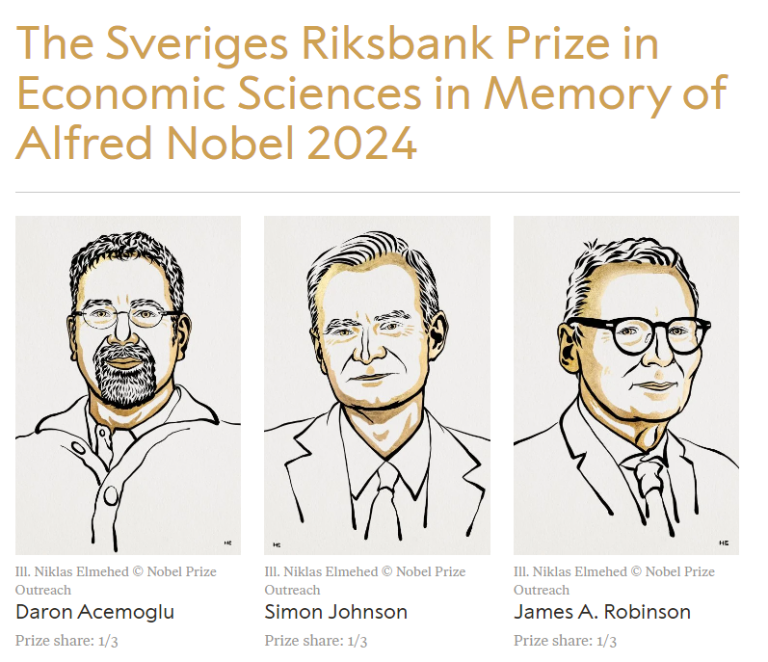The Nobel Prize

The Nobel Prize is a set of prestigious international awards given annually in several categories including Physics, Chemistry, Medicine, Literature, Peace, and Economic Sciences. Established by the will of Alfred Nobel, a Swedish inventor and philanthropist, in 1895, the prizes aim to recognize individuals or organizations that have made outstanding contributions to humanity in their respective fields.
Each Nobel Prize comes with a medal, a diploma, and a financial grant. The recipients, known as laureates, are selected through a rigorous process involving nominations and evaluations by expert committees. The awards are announced annually on 8-14 October and presented on December 10, the anniversary of Nobel’s death, in a ceremony held in Stockholm, Sweden, except for the Peace Prize, which is awarded in Oslo, Norway.
The Nobel Prizes are highly respected globally, symbolizing excellence and a profound impact on society.
Explore Nobel Prizes 2024
The Nobel Prize in Physiology or Medicine

The Nobel Prize winners in Physiology or Medicine were American scientists Victor Ambros and Gary Ruvkun for their groundbreaking discovery of microRNA. MicroRNAs are small RNA molecules that play a crucial role in regulating gene expression, controlling how genes are turned on or off after transcription into messenger RNA (mRNA). Their research, initially conducted on the roundworm C. elegans, has significantly deepened our understanding of gene regulation across all multicellular organisms, including humans.
This discovery has important implications for various biological processes and diseases, including cancer and other conditions where gene regulation is disrupted. While no specific medical treatments targeting microRNA have been fully developed yet, ongoing clinical trials are exploring their potential as therapeutic targets.
This recognition marks a significant milestone in genetics and molecular biology, building on decades of research in understanding how genetic information is translated into biological function. (NobelPrize.or
The Nobel Prize in Physics

The Nobel Prize winners in Physics were John Hopfield from Princeton University and Geoffrey Hinton from the University of Toronto. They were honored for their pioneering work in artificial neural networks, which laid the foundation for modern machine learning. Their discoveries and inventions have significantly advanced artificial intelligence, enabling computers to process complex data and learn from it in ways that resemble human cognition. This breakthrough has profoundly impacted fields ranging from healthcare to autonomous systems. (NobelPrize.org)
The Nobel Prize in Chemistry

The Nobel Prize winners in Chemistry were three scientists—David Baker, Demis Hassabis, and John Jumper—for their pioneering work in protein structure prediction and design. Half of the prize went to David Baker, a biochemist from the University of Washington, for his contributions to computational protein design, particularly through developing the software, Rosetta. This tool allows researchers to create new proteins with potential applications in medicine and materials science.
The other half of the prize was jointly awarded to Demis Hassabis and John Jumper from Google DeepMind for creating AlphaFold. This AI model solved one of biology’s biggest challenges: predicting the 3D structure of proteins from their amino acid sequences. Their work with AlphaFold revolutionized the field by achieving unprecedented accuracy in protein structure prediction, a problem that had stumped scientists for decades (NobelPrize.org)
The Nobel Prize in Literature

The 2024 Nobel Prize in Literature was awarded to South Korean author Han Kang. She was recognized for her “intense poetic prose that confronts historical traumas and exposes the fragility of human life.” Han Kang’s role as an author is to use her writing to explore deep and difficult emotions, often focusing on human suffering and trauma. She tells stories that make people think about the pain and struggles that humans go through, such as war, violence, or personal challenges. Her style is known for being poetic and emotional, helping readers understand the fragility and beauty of life even in the darkest times. Her win is seen as a monumental achievement for South Korean literature, marking the first time a South Korean author has received this prestigious honor. (nobelprize.org)
The Nobel Peace Prize

The 2024 Nobel Peace Prize was awarded to Nihon Hidankyo, a Japanese organization representing survivors of the atomic bombings of Hiroshima and Nagasaki, known as Hibakusha. Nihon Hidankyo received the prize for its persistent efforts to advocate for a world free of nuclear weapons. Through powerful witness testimonies, the organization has helped establish the “nuclear taboo,” a global movement stigmatizing the use of atomic weapons as morally unacceptable. The award recognizes the survivors’ contribution to raising awareness of the devastating humanitarian impacts of nuclear weapons and their efforts toward nuclear disarmament. (nobelprize.org)
The Nobel Prize in Economics

The 2024 Nobel Prize in Economics went to researchers Daron Acemoglu, Simon Johnson, and James Robinson for showing how the strength of a country’s political and economic institutions affects its prosperity. They discovered that nations with stable, fair institutions are better able to achieve economic growth, while those with exploitative systems often struggle to improve people’s living standards. For example, countries that developed inclusive institutions during colonial times tend to be more economically successful today, while those left with extractive, exploitative systems often face persistent poverty.
Their work helps explain why economic differences between countries persist and suggests that creating fair, reliable institutions is crucial for economic success. The researchers’ insights are valuable for understanding historical inequalities, shaping policies to reduce current global income gaps, and guiding new technologies, like AI, in ways that benefit society. (nobelprize.org)
